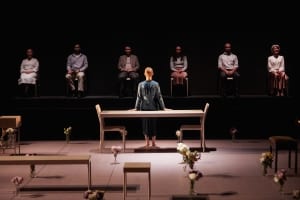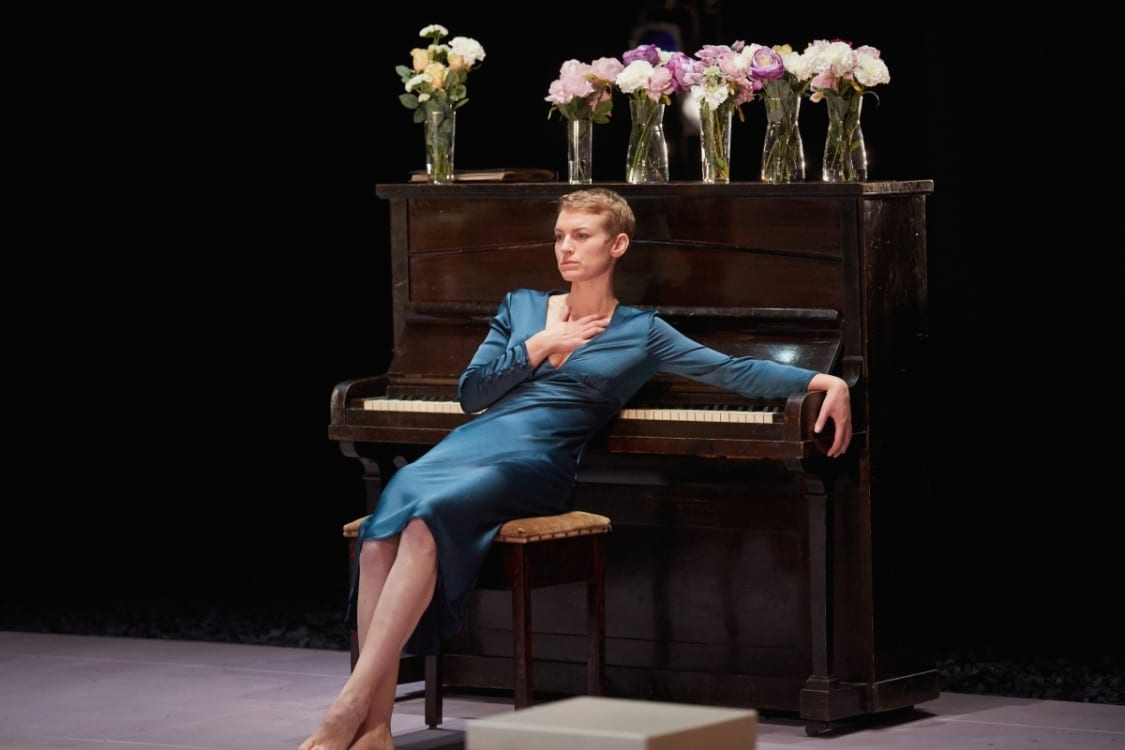At the beginning of the Sherman Theatre’s new production of Hedda Gabler, Hedda (Heledd Gwynn) is alone on stage, her back turned to us. Her husband George Tesman (Marc Antolin) and his aunt Juliana (Nia Roberts) talk excitedly about the couple’s happy prospects, while the maid Bertha (Caroline Berry) arranges the flowers. All the while Hedda stands still. But the moment she comes in, the happiness shatters. The flowers? Stifling. Aunt Juliana’s new hat? Old and ugly. Bertha? Dismissed. Why should others have their fun if she can’t have hers, stuck as she is in a boring marriage? Hedda is a malcontent. She throws things, she stands on furniture, she is rude to servants. It is to Heledd Gwynn’s credit that she gives Hedda’s pyromaniac desire to destroy, wither, and wreak havoc a fascinating touch of relatability. We shiver with her at the touch of her overly enthusiastic, but naïve, husband, and imagine Hedda’s loneliness during the couple’s honeymoon. We share in her disgust at George’s best friend, Judge Brack (played by Richard Mylan), as he lasciviously gets on all fours to come kiss her bare foot behind her husband’s back.
Most susceptible to Hedda’s charms is her old lover Eilert Loveborg (Jay Saighal), a young academic who is George’s intellectual superior and his rival on the path to a professorship. When he finds comfort in his romantic and professional liaison with Thea Elvsted (Alexandria Riley), a former schoolmate of Hedda’s, Hedda cannot but want to destroy that, too.

This is not to say that she doesn’t have an excuse for wanting to do so. Alexandria Riley proves her strength as an actress when she renders Thea’s well-meaning but ever so slightly dull wish to rescue Eilert from his old demons. As George Tesman, Marc Antonin is the right mix of pleasant, earthly, and a tad bland. It is no wonder Hedda is bored – then again, as many other characters tell her, it takes audacity to live fully and that’s just what Hedda lacks, preferring instead to live an embittered life in her husband’s company. But for how long?
Another way in which Hedda is made personable to us is that she is never allowed to be alone. Even when she is the sole character standing on stage, Rosanna Vize’s brilliant design has all other protagonists sit on chairs at the back of the set, watching in silence after their turn to speak has passed. The overpriced house that Hedda’s husband bought for her is portrayed by a suspended structure that lowers gradually upon the stage until it encloses all characters within its walls. Flowers are spilled everywhere, and ashes come to cover the set slowly as Hedda’s seductive, impish yearning for chaos burns her stage partners. In this direction, the cool, stylish domestic interior of Hedda’s house becomes bleaker and bleaker, all to the sound of a low, tense soundtrack composed by Giles Thomas. Hedda Gabler comes to an end in one last pistol shot, an ending as economical and final as this production is elegant and sharp.

